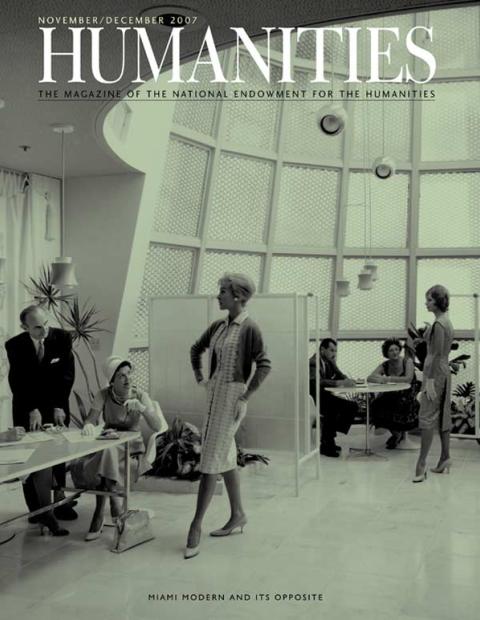A visitor to Humanities Texas’s new headquarters, in downtown Austin, is liable to get the grand tour from the council’s director, Michael Gillette. The hundred-year-old Byrne-Reed House is encased in a sheath of modernizing office décor and was given a stucco façade in the 1970s. But framed photographs on its walls, of young people in 1920s dress grouped on its old Prairie-style porch and of a bride standing on the pre-renovation stairs, show that the place was once a gracious old residence, done in a style that Humanities Texas likes to call “Texas eclecticism”—a mixture of Art Nouveau, Romanesque, and Mission styles, built with materials drawn from Texan sources such as native pine and limestone.
Wielding a flashlight, Gillette makes sure that I can see where the skeleton of the building retains its beautiful brick arches. “Look up there, behind the acoustic tiles,” he says. And sure enough, when I peer beyond the ugly flecked grey ceiling, I can get a glimpse of the building’s past—and of what Gillette plans for its future.
Gillette, who started at Humanities Texas in 2003, sees his mission at the organization as a large-scale version of this tour initiating me to the potential of the Byrne-Reed House—an extended effort to increase public appreciation of the humanities in Texas. He’s the first to admit that the humanities council in Texas has had a visibility problem. People used to call on the organization, he laughs, “to get kittens out of trees.” But under his leadership, the organization has changed its name, updated its logo, and undertaken a major campaign to move into Byrne-Reed House. The old headquarters was in an undesirable location far away from downtown, “with about the visibility of a post office box,” Gillette says. The next step is raising the money to complete the renovation, which will reveal the council’s new home in its historic glory.
Humanities Texas wants to make itself more accessible to the smaller organizations—local museums, libraries, historic centers, and any others who do the humanities—around this giant state. “This job really makes you realize how big this state is,” he says.
Gillette speaks as an authority on things Lone Star. A lifelong Texan, he was born on the Gulf Coast, holds a PhD from the University of Texas at Austin, and spent fifteen years working at the Lyndon Baines Johnson Presidential Library before moving on to a stint as director of the Center for Legislative Archives at the National Archives and Records Administration (NARA), his last job before returning to Texas to take up the reins at Humanities Texas.
Gillette sees part of the council’s role as “disseminating the talent and resources of museums, libraries, and universities throughout the state”—a goal that requires careful attention to geographical distribution. He hands me a map of the state, pinpointing the places where the council has sponsored traveling exhibits, given grants, held grant workshops, and drawn attendees for its teachers institutes. Humanities Texas does seem to be getting the word out: “Sixty-eight of our grantees last year were first-time applicants,” Gillette says. The dots tend to cluster in the Dallas/Fort Worth, Austin, Houston, and San Antonio areas, but there are also impressively far-flung dots in the empty spaces in between.
I also spot some triangles denoting organizations that Humanities Texas, dispersing NEH funds, helped out in the immediate aftermath of Hurricane Rita in 2005—libraries requiring books, or organizations sustaining infrastructural damage. “We were happy to be able to get them money with a minimum of red tape,” Gillette says.
Through its summer teachers institutes, Humanities Texas has been able to collaborate with major cultural institutions and address the culturally diverse communities of the state. Institutes have addressed immigration, the history of the American West, and borderlands themes, while helping to cultivate an impressive list of Texas humanities powerhouses as partners: the Bob Bullock Texas State History Museum, the University of Houston, the University of Texas at El Paso, Texas Christian University, Texas Tech University, Fort Worth’s Amon Carter Museum, the University of Texas at Austin, the Lyndon Baines Johnson Library and Museum, UT’s Center for American History, and NARA. “Each time we hold an institute, the application pool is larger,” says Gillette with satisfaction.
Gillette’s goals for Humanities Texas in the coming years include finishing the renovation of the Byrne-Reed House, which will eventually host lectures and exhibits on its first floor, as well as continuing the council’s commitments to existing programs: traveling exhibits, teachers institutes, small-scale grants to community organizations, outstanding teaching awards, and public lectures. Through all of these efforts, Gillette hopes to bring this big state in under the Humanities Texas roof—both figuratively and literally.


